Why Compliance Training is So Important: A Full List
Is it even possible to run an organization in the modern world without breaching some sort of law? That’s why compliance training is so important. Without it, I guarantee you’re in violation of something, whether you know it or not. But, in case you aren’t convinced, here’s a comprehensive list of reasons.

There’s a high chance that some sort of governmental regulation influences how you do business. It doesn’t matter what industry you’re in.
These regulations exist to make sure companies handle the information they work with properly and/or operate in a safe manner.
Sounds pretty simple, right?
Most people agree that there needs to be laws and regulations in place to make sure companies don’t cut corners. However, compliance in any form continues to prove itself more difficult than it sounds.
In fact, 70% of companies don’t believe that they’re complying with all of the necessary regulatory laws to operate in their own industry. That’s a startling statistic, especially considering the industries involved in some of the biggest regulations.
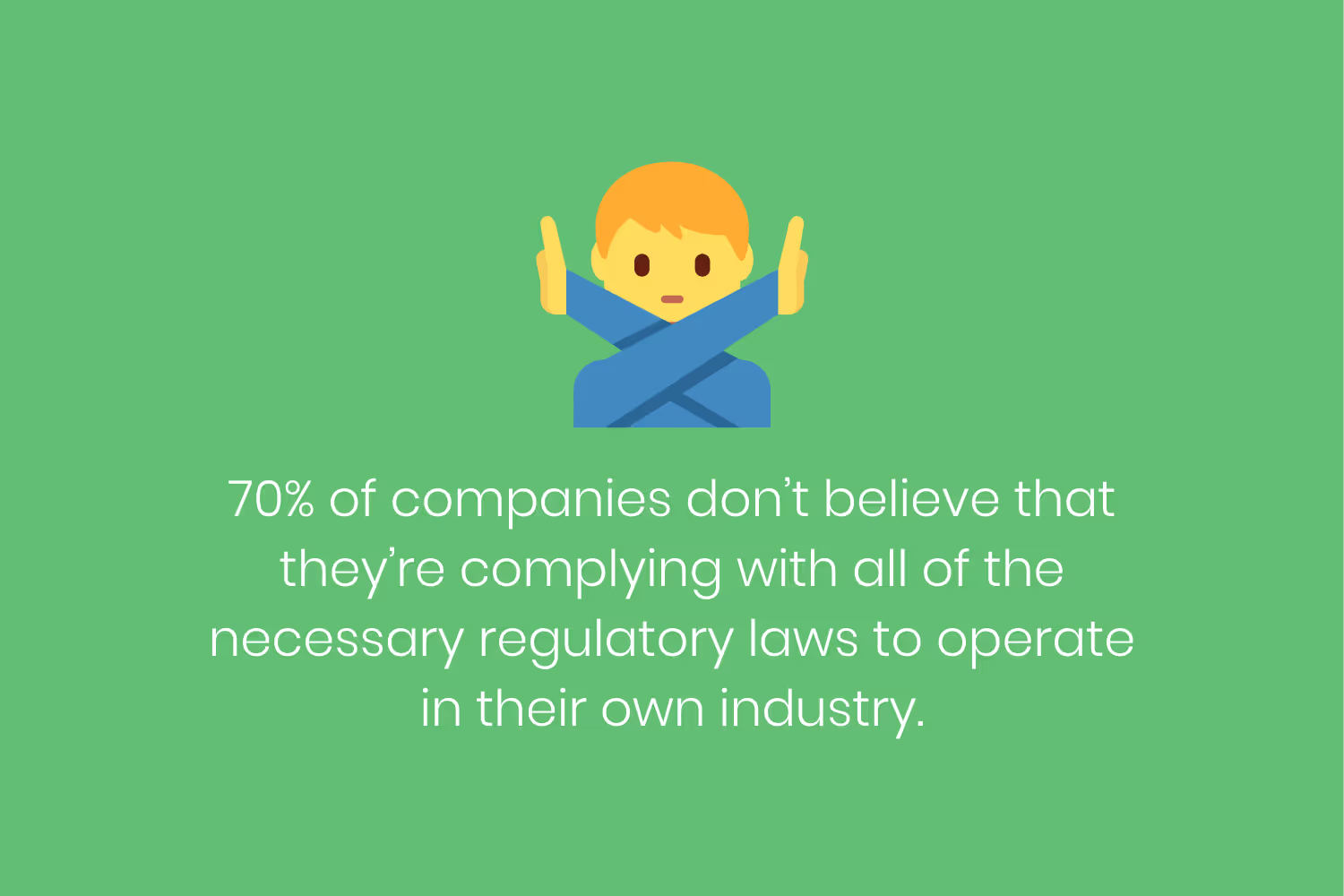
The granddaddy of all of these laws is the Occupational Safety and Health Administration Act (OSHA) that’s been around since 1971. It requires that all organizations provide safe and healthy working conditions. It’s such an old law that their penalties have had to adjust for inflation over the years.
Healthcare organizations and their partners have to operate according to the Health Insurance Portability Act (HIPAA). In a nutshell, it spells out what’s expected from healthcare professionals when handling protected health information (PHI). Complying with it, though, costs around $8.3 billion annually.
Any organization that processes online payments has to keep the Payment Card Industry Data Security Standard (PCI DSS) in mind or else face a massive legal troubles. Continuing to operate without staying in compliance with this law could cost an organization $100,000 every month.
Then there are the two newer regulatory laws from 2018…
- General Data Protection Regulation (GDPR)
- California Consumer Privacy Act (CCPA)
Both of these laws protect the privacy of consumers, especially online.
After this quick overview, you get my point.
Is it even possible to run an organization in the modern world without breaching some sort of law?
That’s why compliance training is so important. Without it, I guarantee you’re in violation of something, whether you know it or not. But, in case you aren’t convinced, here’s a comprehensive list of reasons.
Reduces Risk of a Violation
Of course, the first reason is the most obvious. By hosting compliance training courses, you’re reducing the risk of facing a violation.
But it’s not a new concept and many businesses already hold training and re-training sessions frequently. Of those who do, 63% believe that their program helps reduce their resolution time of regulatory issues.
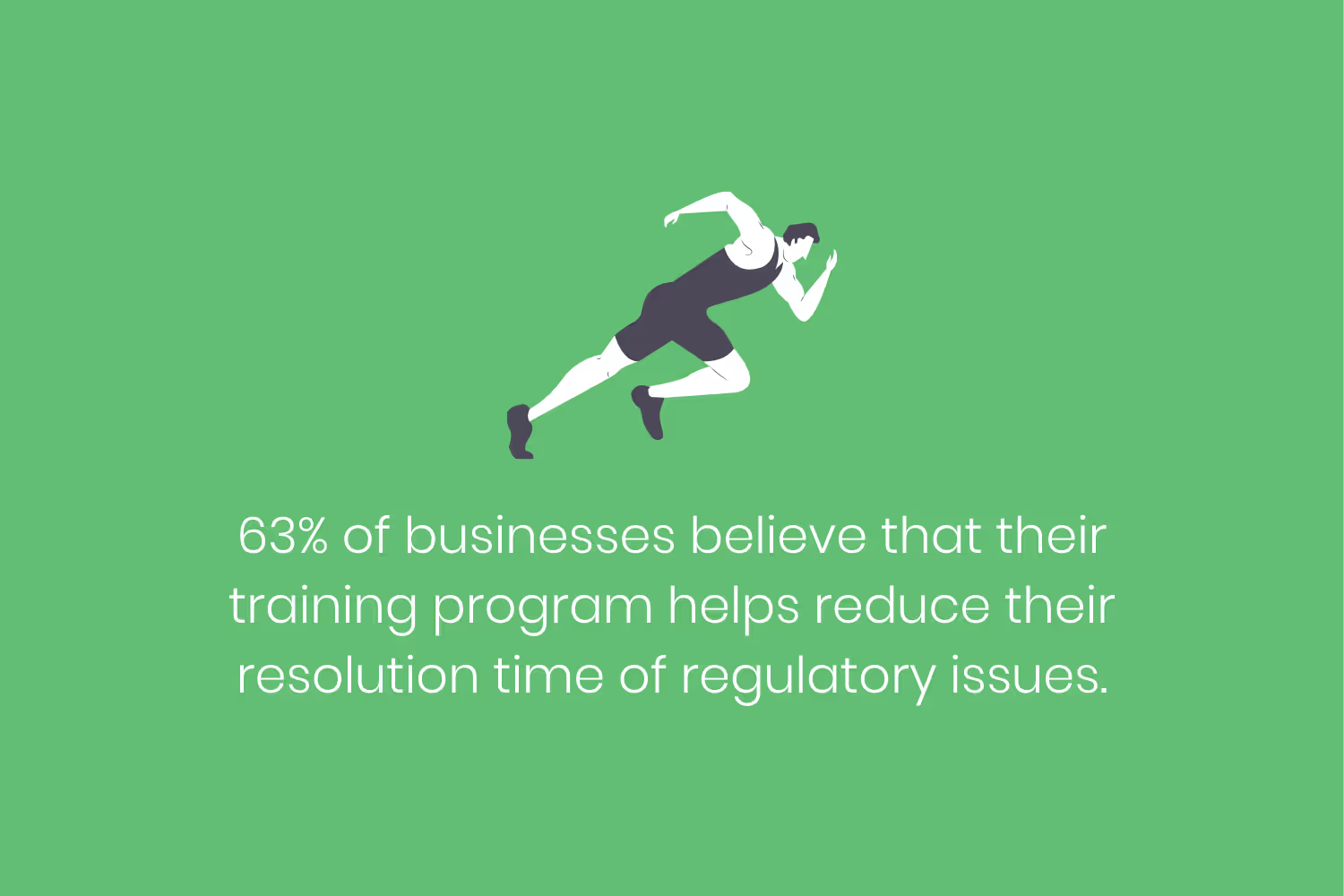
They believe this because their employees know how to avoid a violation, and what to do in the event that one occurs.
Your employees are your biggest risk.
They’re the ones who work with the sensitive data you use on a daily basis.
In other words, if they aren’t properly trained on how to handle your data or work safely at your worksite you’re going to face multiple breaches sooner rather than later.
Maybe you’ve explained to them the importance of the law but haven’t gone over all of its intricacies.
By training your employees on the in’s and out’s of the regulations your organization needs to stay compliant with, you’re saving time and money. They’ll know what is and isn’t allowed and the proper course of action if something goes wrong.
Lowers Costs of Fines
Some compliance professionals believe that a regulatory breach is an inevitability. This consensus is especially true within the cybersecurity space.
So if a breach will happen to your organization at some point or another, what’s the point of compliance training? Why not just cut your losses and account for the impending breaches on your annual balance sheet?
Well, it’s worth mentioning here that governmental bodies increase their fines for repeated breaches.

In other words, cutting your losses simply isn’t an option.
Educating your team, however, can lower the overall cost of penalties. Specifically, coaching your employees about what they have to keep in mind while conducting business at your organization can lower the overall cost of a fine by $9 per breached record.
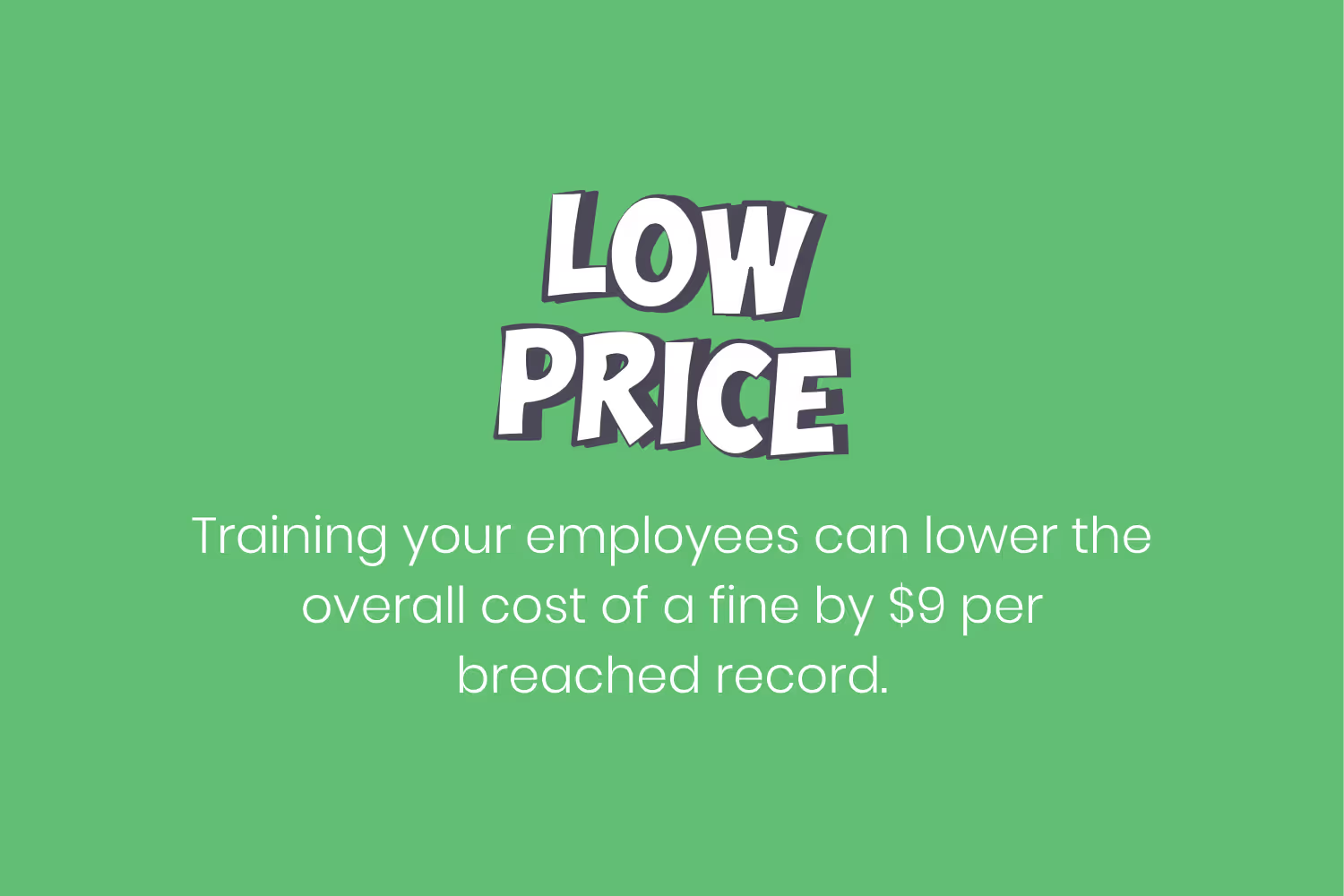
That statistic might not make sense unless you already know what I’m about to cover.
Some of these strict regulations have a clause within them that states what’s expected from organizations at a minimum.
The best example of this is the Minimum Necessary Standard within HIPAA. Specifically, this standard exists within the Privacy Rule and states what healthcare organizations and their partners need to make reasonable efforts to ensure the safety of the PHI they work with on a daily basis.
Out of all of the sensitive data in the world, the information transmitted through the healthcare industry is the most desirable by hackers. That means malicious groups will do whatever they can to get their hands on it. As a result, healthcare organizations get bombarded with cybersecurity attacks. One slip up from a medical staff member or their cybersecurity protection program and you could face a massive fine.
However, if the victim of the attack has safeguards in place to protect their patient’s data, the Department of Health and Human Services (HHS) may fine them lower than they would a practice with nothing in place.
Boosts Productivity Across The Board
You’ve probably heard before that training your employees boosts the productivity of your office across the board.
That statement is also true when it comes to compliance training.
Sure, laws and policies are inherently hard to understand unless you’re a legal professional. But once you’ve adequately trained your employees over the regulations pertaining to the industry you serve, your organization will be more successful.
To put what I’m saying into numbers, companies that offer training programs to their employees have a 218% higher income per team member.

As an employer, you already invest a lot of time, money and resources into your staff. But, above everything, you need to realize that they want to continue to grow professionally grow by learning. Of course, they’ll naturally garner new skills throughout their tenure with you.
However, compliance training provides your team with the opportunity to grow the moment that they start their first day at your organization.
So not only are they excited that they’re starting their career with you, but they’ll also understand that you’re fostering a growth environment on day one that they’re with you.
Protects Your Organization's Reputation
Depending on the size of the breach your organization commits, it might grab natural headlines.
As the old saying goes, “All PR is good PR.” Right?
Well, look at it this way, would you choose a construction company that just injured most of their team because of an unstable structure to build your next headquarters? How about a healthcare practice that just got fined over $100,000 for leaking patient records on an unlocked computer?
Both of those instances would lead to a special on your local news station because of their severity.
What I’m trying to say is that a breach of any kind, whether it be OSHA or HIPAA, has a negative impact on your organization’s reputation. According to the statistics, you’d lose almost one-third of your customer relationships after experiencing a breach.
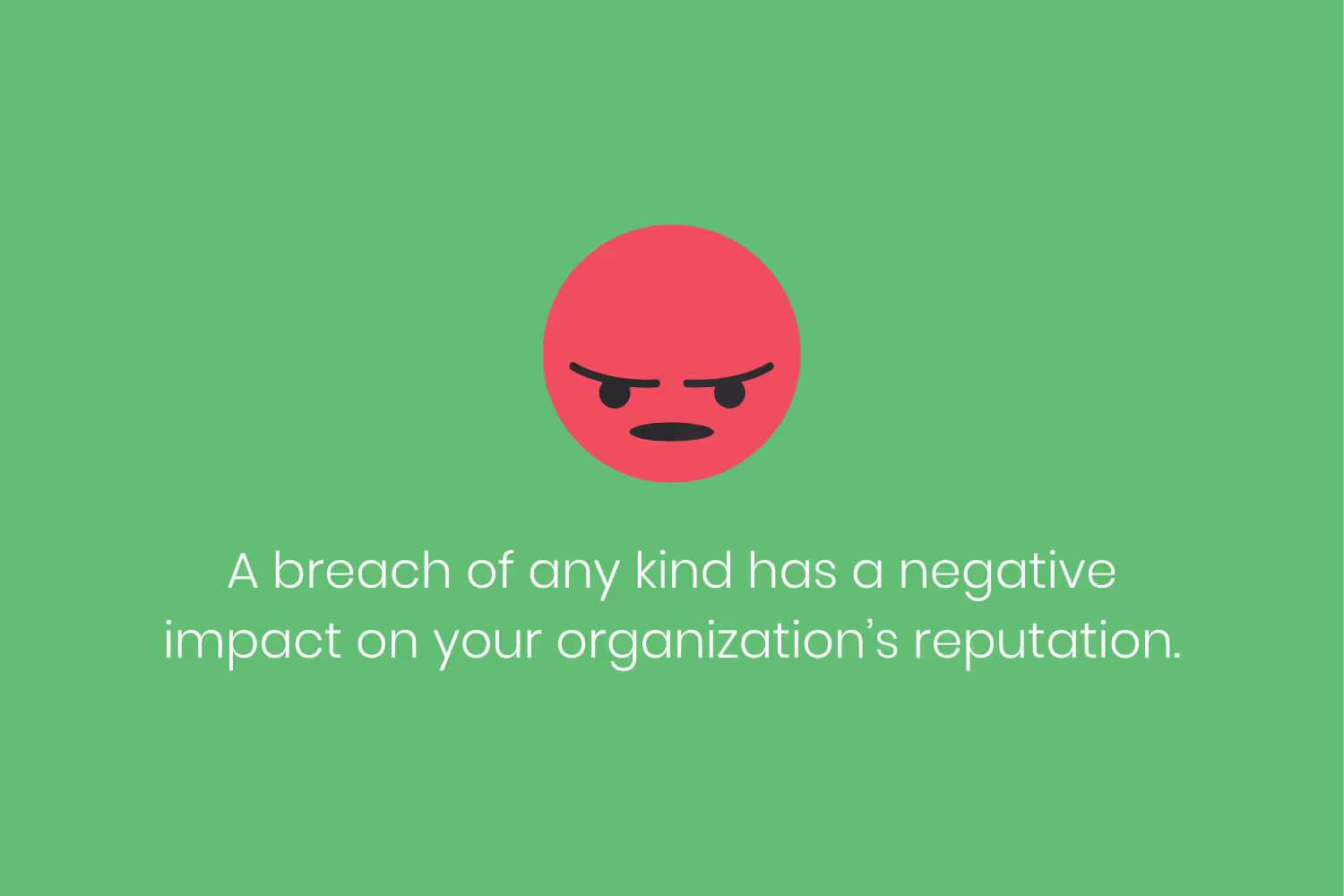
But breaches are inevitable, aren’t they? How are you supposed to retain any clients if that statistic is correct?
Well, two things really need to happen in your organization to save your customers. First, compliance training to significantly lower your chances of experiencing a breach. Second, is to implement a comprehensive incident response plan.
By having both of those in place, you’re preventing future issues while having a backup plan in the event something goes wrong at your organization.
Creates a Safe Work Environment
Imagine going to work only to get injured or feel uneasy because you’re worried about getting a visit from a legal organization telling you that you’re under investigation.
Both of those circumstances doesn’t help your efforts in cultivating a safe work environment.
Instead, it has an impact on your employee’s health. Whether it affects their physical health due to an unsafe job site or their mental health because of the constant, underlying pressures of the data they work with, you want your employees to feel safe.
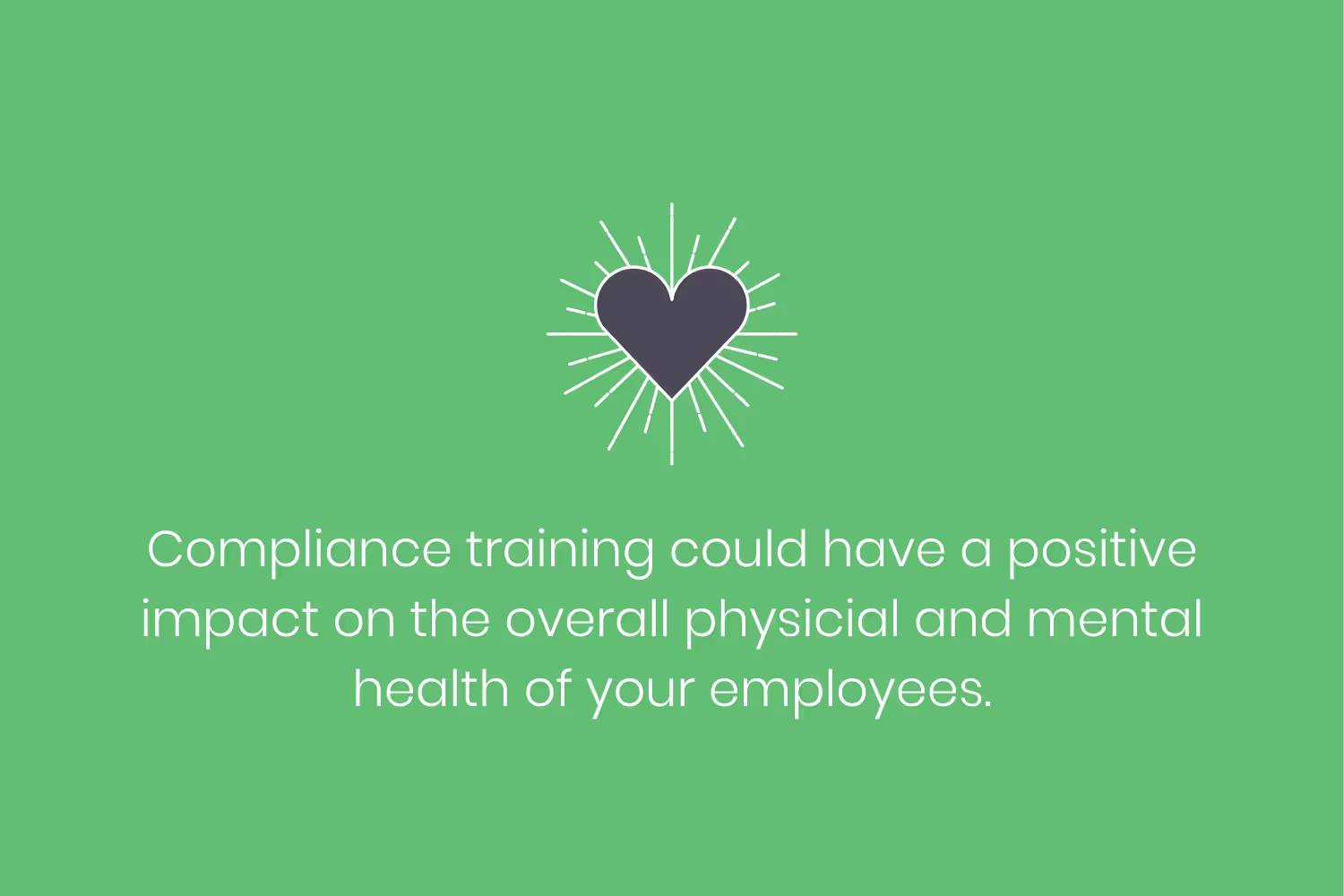
As I mentioned in an earlier section, by hosting compliance training sessions you’re boosting productivity. Well, you’re also creating a safer workplace.
Think about it, your employees will be more mindful of what restrictions and codes they need to keep in mind while doing their day to day job.
According to a study published by the Construction Safety Assocation of Ontario, increased training, results in fewer lost-time injuries, lower costs, and more profit. When the workplace is safer, fewer employees will be on medical leave making it easier to get more revenue.
Conclusion
Compliance training isn’t a small undertaking. You’ll have to research, design a curriculum, and schedule dates for your team. However, the perks of hosting these sessions on a monthly, quarterly, or annual basis far outweigh the upfront “costs” associated with the beginning steps.
The reality is that most industries have a few big regulations that they have to keep in mind to do business.
If your industry doesn’t have to worry about a regulation yet, it’s only a matter of time. Knowing what to do now to prepare your company for continued growth ensures the future success of your business.
Emphasize your product's unique features or benefits to differentiate it from competitors
In nec dictum adipiscing pharetra enim etiam scelerisque dolor purus ipsum egestas cursus vulputate arcu egestas ut eu sed mollis consectetur mattis pharetra curabitur et maecenas in mattis fames consectetur ipsum quis risus mauris aliquam ornare nisl purus at ipsum nulla accumsan consectetur vestibulum suspendisse aliquam condimentum scelerisque lacinia pellentesque vestibulum condimentum turpis ligula pharetra dictum sapien facilisis sapien at sagittis et cursus congue.
- Pharetra curabitur et maecenas in mattis fames consectetur ipsum quis risus.
- Justo urna nisi auctor consequat consectetur dolor lectus blandit.
- Eget egestas volutpat lacinia vestibulum vitae mattis hendrerit.
- Ornare elit odio tellus orci bibendum dictum id sem congue enim amet diam.
Incorporate statistics or specific numbers to highlight the effectiveness or popularity of your offering
Convallis pellentesque ullamcorper sapien sed tristique fermentum proin amet quam tincidunt feugiat vitae neque quisque odio ut pellentesque ac mauris eget lectus. Pretium arcu turpis lacus sapien sit at eu sapien duis magna nunc nibh nam non ut nibh ultrices ultrices elementum egestas enim nisl sed cursus pellentesque sit dignissim enim euismod sit et convallis sed pelis viverra quam at nisl sit pharetra enim nisl nec vestibulum posuere in volutpat sed blandit neque risus.

Use time-sensitive language to encourage immediate action, such as "Limited Time Offer
Feugiat vitae neque quisque odio ut pellentesque ac mauris eget lectus. Pretium arcu turpis lacus sapien sit at eu sapien duis magna nunc nibh nam non ut nibh ultrices ultrices elementum egestas enim nisl sed cursus pellentesque sit dignissim enim euismod sit et convallis sed pelis viverra quam at nisl sit pharetra enim nisl nec vestibulum posuere in volutpat sed blandit neque risus.
- Pharetra curabitur et maecenas in mattis fames consectetur ipsum quis risus.
- Justo urna nisi auctor consequat consectetur dolor lectus blandit.
- Eget egestas volutpat lacinia vestibulum vitae mattis hendrerit.
- Ornare elit odio tellus orci bibendum dictum id sem congue enim amet diam.
Address customer pain points directly by showing how your product solves their problems
Feugiat vitae neque quisque odio ut pellentesque ac mauris eget lectus. Pretium arcu turpis lacus sapien sit at eu sapien duis magna nunc nibh nam non ut nibh ultrices ultrices elementum egestas enim nisl sed cursus pellentesque sit dignissim enim euismod sit et convallis sed pelis viverra quam at nisl sit pharetra enim nisl nec vestibulum posuere in volutpat sed blandit neque risus.
Vel etiam vel amet aenean eget in habitasse nunc duis tellus sem turpis risus aliquam ac volutpat tellus eu faucibus ullamcorper.
Tailor titles to your ideal customer segment using phrases like "Designed for Busy Professionals
Sed pretium id nibh id sit felis vitae volutpat volutpat adipiscing at sodales neque lectus mi phasellus commodo at elit suspendisse ornare faucibus lectus purus viverra in nec aliquet commodo et sed sed nisi tempor mi pellentesque arcu viverra pretium duis enim vulputate dignissim etiam ultrices vitae neque urna proin nibh diam turpis augue lacus.




